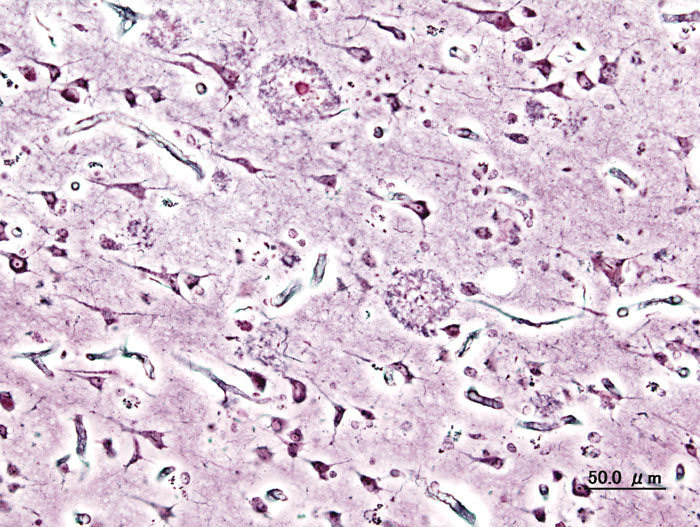I'm sitting with David Weston, PhD student at Cambridge University who's been scouring the neuroscience journals for his top 3 papers of the month.
David - So let's start with a paper that was published in the journal Nature that looks at how your genes can affect your risk of getting Alzheimer's disease.
A group of scientists in Iceland, collaborating with people all over the world, have discovered that a small mutation in one of your genes can dramatically reduce your likelihood of getting Alzheimer's.
Hannah - So, it's a mutation in a gene that actually reduces the risk of Alzheimer's. A beneficial mutation?
David - Yes. The mutation is in the β-amyloid precursor  protein which has been shown in previous studies to be involved with Alzheimer's disease. If you compare the brains of a healthy person and someone with Alzheimer's one of the most striking things is that Alzheimer's patients have large deposits of β-amyloid protein throughout the brain. This causes a whole host of effects including memory loss.
protein which has been shown in previous studies to be involved with Alzheimer's disease. If you compare the brains of a healthy person and someone with Alzheimer's one of the most striking things is that Alzheimer's patients have large deposits of β-amyloid protein throughout the brain. This causes a whole host of effects including memory loss.
This new mutation however, appears to protect against these deposits, giving the person with the mutation a much lower risk of developing Alzheimer's disease and the memory loss associated with it.
Hannah - And is this a combination of human's observational studies and also, scientists looking at cells growing in a petri dish?
 David - The initial study was done with humans and looking at their genetic sequencing, but they also did a range of laboratory techniques that looked In Vitro to see the effect of the mutation. And they found that with this mutation, the toxic production of beta amyloid was actually reduced.
David - The initial study was done with humans and looking at their genetic sequencing, but they also did a range of laboratory techniques that looked In Vitro to see the effect of the mutation. And they found that with this mutation, the toxic production of beta amyloid was actually reduced.
Hannah - So, this paper really demonstrates that a mutation in a particular gene can help us to understand more about Alzheimer's, what's going on in the cell biology of Alzheimer's and may potentially lead to a new treatment for Alzheimer's as well.
David - Second exciting paper - lots of people are studying how we can use technology to help restore function for people who have lost the use of their limbs, either as a result of accident or disease, and the scientists who wrote the next paper have opened up the field with their recent publication in the Journal of Neural Engineering.
The researchers from Imperial College London have developed a pair of glasses that allows a person to control a computer using only their eyes. Previous efforts to deliver these kinds of technologies to people has been hampered largely by their cost and their accuracy but the authors of this paper have managed to build their interface using cheap components from video game consoles.
David - Yeah, so there have been quite a few studies that have looked at these kind of interfaces, but the advantage of this system is that it actually cause a significantly less amount of money compared to these previous studies, and also, the accuracy has been massively improved.
Hannah - And how have they managed to do that then - improve the accuracy and also decrease the cost of this technology?
David - So what they've done is they've actually used cheap components from video game consoles to trap the movements of the eyes using small cameras. So, by tracking these eye motions, the wear of the glasses control a computer to do many things like play games browse the internet or even send emails. And so, this remarkable technology can extrapolate not only where the person is actually looking, but because it works on both eyes, it can also tell at what distance their looking at. And this opens up a whole world of possibilities for what this technology can be used for, and it allows people to interact with a 3-dimensional environment rather than just a 2D one.
 Hannah - Fantastic! So, that's a neat example of how technology arising from play can actually go and help patients.
Hannah - Fantastic! So, that's a neat example of how technology arising from play can actually go and help patients.
David - Yeah, definitely. And indeed, in the paper, they actually had a link to a video which showed them playing a 3D game on a computer which is quite a neat way to show how the device works very well.
David - So, in this last paper, scientists have shed some light on how stress can lead to post-traumatic stress disorder (PTSD) and we all know that fear and anxiety are essential parts of our lives because they teach us to not take a necessary risk and to avoid dangerous situations. But sometimes, anxiety is so intense that it actually prevents people from getting on with their daily lives. And in this new paper, the scientists presented data that showed these molecules called dynorphins play a role in suppressing anxiety in the brain
Hannah - So how did they look into this dynorphins and the role of them in terms of fear and anxiety then?
David - So what they did was they created a genetically modified strain of mice which actually lack the gene to produce these dynorphins and they tested them in a variety of laboratory situations to test how fearful and anxious they were. And they found that these mice that didn't have the dynorphins gene actually showed significantly increase fear response and anxiety response after being tested compared to normal mice.
Hannah - And is there any correlation between these dynorphins and human patients that may show enhanced anxiety or post-traumatic stress disorders?
David - Yes. The authors of the study actually had to look at human subjects and found that there are natural variations in the level of dynorphins in people's brains and they found that with people with lower levels of dynorphins remained more anxious after a painful stimulus was delivered to them compared to those that had high levels of dynorphins after a fearful stimulus. So this really indicates that the dynorphins are a natural anxiety-relieving mechanism that the brain uses.
Hannah - So, it seems these results could help piece together some sort of treatment for people suffering from post-traumatic stress disorder, using natural anxiety systems already existing, but probably not properly functioning in their brains.
Thanks to David Weston, PhD student at Cambridge University.
References
- Previous Neuroscience NewsFlash
- Next Newborn neurones and newborn babies










Comments
Add a comment